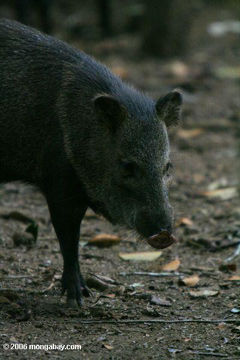New peccary species discovered by embattled Amazon scientist
New peccary species discovered by embattled Amazon scientist
mongabay.com
November 4, 2007
A new species of peccary has been discovered in the Amazon rainforest by a scientist recently charged with biopiracy by the Brazilian government.
The animal, called the giant peccary or Pecari maximus, is described in the October 29 issue of the journal Bonner zoologische Beitrage. It apparently only lives in the Rio Aripuanã river basin in Brazil.
The species was spotted by Dutch biologist Marc van Roosmalen of the University of Leiden during field surveys in the region. Genetic analysis showed that the beast was indeed an undiscovered species of peccary — the fourth known species after the collared peccary, the white-lipped peccary and the Chaccoan peccary. Peccaries are closely related to pigs and are found in tropical forests throughout Central and South America.
The newly discovery peccary reaches a length of more than four feet and weighs almost twice as much as its nearest relative.

The Collared Peccary, a closely-related species |
For Dr van Roosmalen, who previously discovered a new species of porcupine and seven new kinds of primates in the region, the discovery may be a sort of vindication. Earlier this year Dr van Roosmalen made international headlines when the Brazilian government charged him with biopiracy and threw him in prison. The move was widely condemned by scientists around the world who said the charges were trumped up by well-connected development interests who opposed his conservation efforts in the Amazon rainforest. In August a Brazilian judge freed Dr van Roosmalen pending an appeal. The biopiracy charges were dropped.
At the time scientists said the case was indicative of persecution against researchers working in the Amazon.
“Scientists worldwide consider Dr. van Roosmalen’s indictment and sentencing as an attack on the practice and profession of biological science in Brazil, and as an attack on individual scientists,” stated a prominent group of scientists from the Association for Tropical Biology and Conservation in a petition issued in July.
“At a time when ecological research is more critical than ever to enable the wise use and management of plants, animals and microbes in the world’s tropics, Dr. van Roosmalen’s indictment, trial, sentencing, incarceration and the associated media response is already discouraging biological research in Brazil, both by Brazilian scientists and by potential international collaborators,” the petition continued. “Dr. van Roosmalen’s situation is indicative of a trend of governmental repression of scientists in Brazil.”